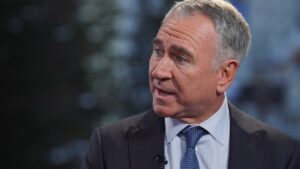A private banker is a banking professional who offers concierge-like financial services to affluent individuals. They often work within a separate division of a large bank or are part of a smaller bank that specializes in private banking services.
The typical private banking client is someone who requires a range of services that go beyond just checking and savings accounts and span into investment portfolios, trusts, business accounts and complex loans, says Jay Pelham, president of Kaufman Rossin Wealth, a wealth management firm in Miami.
Clients are usually high net worth individuals. According to a 2021 , there are 22 million millionaires in the U.S., so that is the potential market size for private banking. But for some wealthy customers, a standard banking relationship with a financial institution may be a better fit, says Pelham, who has worked with private banks during his 30-year banking career and who still advises clients who use private banking services. Here are some ways to know if you might want to consider private banking.
Private bankers are known for offering high levels of personalized service. When you’re trying to put together an estate plan, or you’re looking for a mortgage for your next business, it can be difficult to walk into a bank branch and know exactly what to ask. A dedicated private banker who’s familiar with your banking portfolio can help shepherd you into the right departments, Pelham says. “Your banker may not only know your name, but they may know the name of the specialized insurance provider that can help protect your business as it grows,” he says.
Another perk is the level of accommodation a private banker offers. If you have an urgent need to review and sign financial documents in person, a private banker may come to your home or place of business, at your request, to fill out the paperwork, Pelham says.
But you don’t necessarily need a private banker to receive personalized attention. If you have over $1 million in assets at your local bank, the branch manager may go out of their way to tend to you, recognize your financial needs and give you good service. With that same amount ($1 million-plus), Pelham notes, you might also meet the asset requirement for a private banker, but that banker could in turn have other clients with more assets who receive more attention.
“My guidance is to find where you would be the best fit. You might be better off with a bank branch where you’re showered with attention,” he says.
A private banker will try to meet all your financial needs with services from their bank. Having all your accounts at one institution keeps things simple, but it’s not for everyone. You may prefer to shop around for better pricing from different providers. Or, if you already have financial relationships with professionals outside your bank, you may not want to move all your accounts to one institution.
Private bankers will work closely with a client’s advisory team, but if you rely on advisors who aren’t affiliated with your bank, you may not have as strong a need for private banking services, Pelham says.
According to Christopher Brandriff, who oversees four Florida offices of J.P. Morgan Private Bank, there’s no minimum deposit balance required to receive the megabank’s private banking service; generally, the bank works with clients who have investable assets worth at least $5 million. “We consider the complexity of a client’s balance sheet and their specific needs rather than their investable assets,” he said in an email.
When it comes to fees, high net worth clients aren’t likely to pay for smaller services, such as buying checks or ATM surcharges, Pelham says. Instead, banks are likely to make their money from the financial services the clients use. For example, if you’re an investing client, the bank may charge fees based on a percentage of invested assets. “Bankers aren’t usually going to nickel and dime their private banking clients with unnecessary bank fees,” he says.
Some banks offer private banking services for customers with smaller bank balances — thousands of dollars instead of millions — but those services may come with monthly fees if the minimum balances aren’t kept.
But you don’t have to be a multimillionaire or have private banking to avoid bank charges. Many and accounts, particularly those at online banks, don’t have monthly fees, and some institutions offer perks, such as ATM fee reimbursements.
If you have substantial assets in your current bank, your bank will probably find you, Pelham says. The with well-known names generally have private banking divisions and are likely to reach out to those with large balances. Smaller banks often find clients through word-of-mouth, he says.
If you are in the fortunate position of being able to choose whether to use a bank’s private banking services, consider the relationship you want from that institution. Your current banking relationship may suffice if it meets your needs and you already have a strong team of financial advisors. But if you have substantial assets and will rely heavily on your banker’s advice, a private banker could be an important part of your team.
This post was originally published on Nerd Wallet







